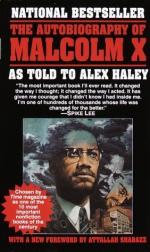|
This section contains 2,863 words (approx. 10 pages at 300 words per page) |

|
SOURCE: "Adapting the Autobiography," in Cineaste, Vol. XIX, No. 4, 1993, pp. 5-7.
In the following essay, Locke discusses director Spike Lee's film adaptation of The Autobiography of Malcolm X.
At the core of Spike Lee's [film] Malcolm X is The Autobiography of Malcolm X, a story that draws from the breadth of twentieth-century African-American experience. Like any narrative contemporaneous with a past era, the autobiography contains elements that most moviegoers today would find antiquated or irrelevant. From the outset, then, Lee's intent to tell history is at odds with the needs of a mass market, and the film's transformation of Malcolm X to meet contemporary expectations has significant consequences for historical accuracy and dramatic impact.
The story is fundamentally tripartite in structure: a man leads an aimless, self-destructive life; he experiences enlightenment; he is redeemed. Since enlightenment occurs nearer the middle of the story than the end, Malcolm's prison...
|
This section contains 2,863 words (approx. 10 pages at 300 words per page) |

|


